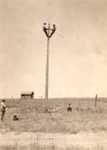Cannery in McCook's future

A second person was killed during the construction of the McCook Army Air Base. Elmer "Shorty" McClung, 36, an employee of Crawford Electric Co. of North Platte suffered a severe electric shock while at work on a transformer pole on a power line at the air base and fell about 25 feet to the ground.
He was married to a McCook girl, Dorothy Rowland McClung, who worked for Northwestern Bell and they had two boys and a girl. The iron lung that the Girl Scouts had purchased two years previous was brought out to the base in an effort to save the man's life.
The only other death had been a truck driver who overturned between the sand pits and the base building site about 10 miles north of McCook.
The question on Harry Strunk's mind in May of 1943 was -- could McCook and Nebraska learn from the experience of growing their own food in the Victory Gardens and canning the excess.
"Will they find that it is possible and feasible to grow and process their own vegetables? May not this experience some day result in a local cannery? It is not likely that out of this lession in thrift we people of the Republican Valley may learn that it is not only uneconomical, but silly, to grow the very things we eat right here in our own valley ... ship the product east to be processed ... ship it back again to the local markets for consumption out of tin cans and bottles. In that process not only do we lose the first profits for the grower, but we lose the value of labor involved in the processing."
Harry's editorial of May 19th said that a committee of the local Chamber had talked about a cannery being operated here and had sent representatives to Scottsbluff to study the canneries they had there.
The report of the committee was not favorable and the matter was dropped. "The Scottsbluff canneries are still in operation, as are canneries over the state ..." Harry emphasized. He said that the Chitwood Packing plant in McCook was a perfect example that we could produce and process our own products "as efficiently as in Omaha, Denver or Kansas City."
Remember Mr. Bobinmyer's letter in last week's column about the discourteous soldiers? Capt. Leo L. Mellon, base commander of the McCook Army Air Base, wrote a letter of "profound" apology to Mr. Bobinmyer and said he was posting copies of the letter "in conspicuous places all over the base so that the soldiers may read it." He said that the incident was just an unfortunate event and should not be taken as a reflection upon the character of the soldiers based at McCook.
I found that local author Mary Ellen Marshall (Goodenberger) won $6 in an essay contest for Junior college students in early May, 1943. The essay, "Letter to the President" was written by Mary Ellen along the same lines as the play "Our Town."
The hypothetical writer of the letter tells the president about his daughter and her opinions of the world at that time. The young lady eyed the Waves and Waacs with some envy but thought that, "the students of today will be the citizens of tomorrow and should get their education before anything else." She compared the American people with the proverbial ostrich who hides his head in the sand when he senses danger as we hid our heads before Pearl Harbor. Mary Ellen wrote that, "Pearl Harbor united us as nothing else could have. We stopped bickering among ourselves and went to work." It's no surprise that Mary Ellen has always maintained her interest in letters...both her own and those of others. Mary Ellen Goodenberger's book, currently in bookstores is, Letters To The Literate.
The very next day, May 21, 1943, the Gazette carried an article by Sgt. Evelyn Moore, member of the WAAC Recruiting staff in McCook entitled, "A Plea to Women Who Can Join WAAC...". "It is the patriotic duty of every woman to do her share...the sooner we do, the sooner our men will come home...Each soldier is saying to you, 'I'll stay out here 10 years, if necessary. That's my obligation to you. But don't make me stay out here 10 minutes longer than necessary; that's your obligation to me.'"
Hested Stores advertised 2,000 fresh cut peonies just in time for Memorial Day. There would be no advance orders accepted and the colors of the peonies.
May 21 of 1943...Abbott and Costello were on at the Fox Theater; Pete Monzon boxed and won (with "savage punching") at Memorial Auditorium while in Philadelphia Bing Crosby and Bob Hope were playing in a charity golf tournament.
